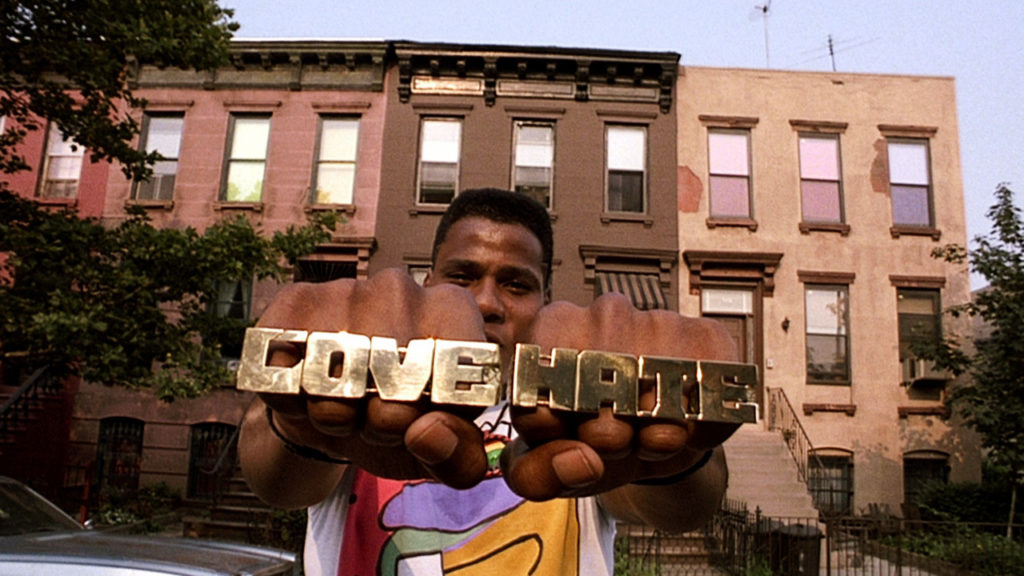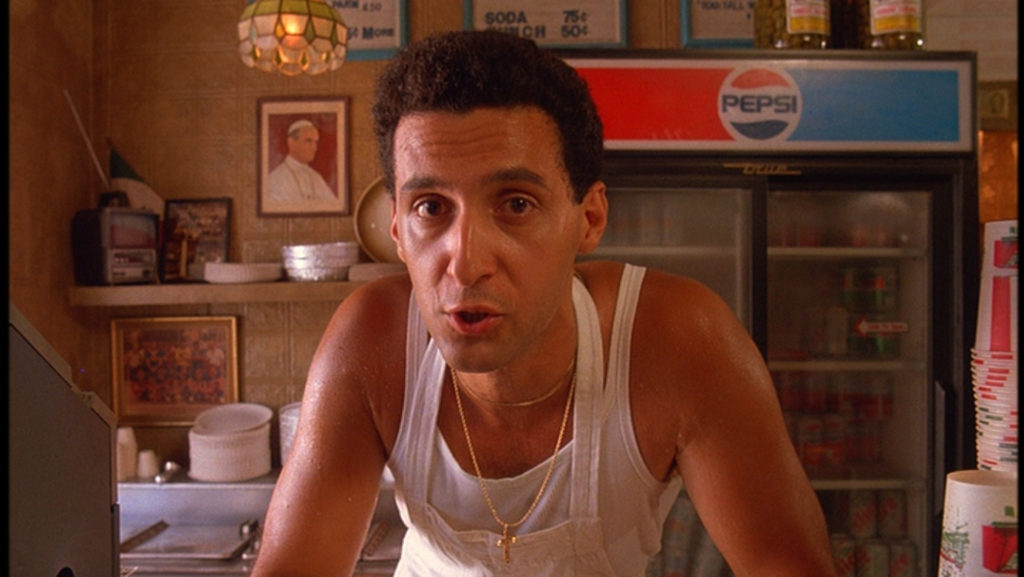Back after a brief hiatus: my ‘New York State of Mind’ series.
When it was released in July 1989, Do the Right Thing was a grenade thrown from the front line: the system isn’t working; America is a pressure cooker, not a melting pot. Spike Lee’s film, about two days in the life of a community in Bedford-Stuyvesant, Brooklyn, showed people from different ethnic backgrounds crowded together cheek by jowl, always threatening to tear each other apart.
Thirty years later, the film remains as raw and unflinching as ever.
The opening credits are a primal scream.
A lone saxophone wail, followed by a young woman (Rosie Perez), dressed in red and black, alone in front of a backdrop of a brownstone, flexing and bouncing like a boxer to the sound of Public Enemy’s ‘Fight the Power’. Perez dances with defiance; it’s no surprise when she switches clothes mid-sequence and reappears dressed for the ring. “I’m ready and hyped and plus I’m amped/ Most of my heroes don’t appear on no stamps,” Chuck D raps, on a song written for the film at Lee’s request. As opening manifestos go, Do the Right Thing’s is uncompromising—and unforgettable.
Heat pours off the screen.
The film takes place during a summer so scorching the local DJ, Mister Señor Love Daddy (a smooth Samuel L. Jackson), issues a Jheri curl alert, warning listeners with the style to stay inside or risk ending up with plastic helmets on their heads. Up and down the block, the only thing uniting everyone is a desire to escape the heat. Tina (Rosie Perez) dunks her head in ice water; teenagers open a fire hydrant and drench themselves in the spray. The film’s colour palette intensifies the heat: from Wynn Thomas’ production design to Ruth Carter’s costumes, there isn’t a pastel in sight. And cinematographer Ernest Dickerson shoots in an amber filter that cranks the temperature up even higher. The heat is essential, both as the reason tempers fray and as an external symbol of inner tension.
Spike Lee isn’t afraid of discomfort.
The residents are uneasy and often so are we. Lee, who wrote, produced and directed the film, does everything to shake viewers out of their comfort zones. Radio Raheem (Bill Nunn) is so imposing he tilts reality: the camera announces his arrival, boom box in tow, with canted angles which suggest gravity has shifted on its axis. During his and Sal’s (Danny Aiello) first confrontation, the camera cuts closer and closer to the characters, until we can see the individual beads of sweat on Raheem’s forehead. Everywhere the film looks, bigotry and resentment lie around like dry kindling, waiting for a spark. Do the Right Thing isn’t comfortable to watch; it isn’t meant to be.
We hate what we fear and fear what we hate.
Few characters do more to strike that spark than Pino (John Turturro), Sal’s elder son, an inveterate racist with an inferiority complex and a hypocritical fondness for black celebrities. Pino loathes the neighbourhood and the black customers who keep his father’s pizzeria in business and bullies Sal’s deliveryman, Mookie (played by Lee), whom he is obsessed with keeping in what Pino believes is his place. What he refuses to admit, to Mookie or himself, is that underneath all the bile, he’s afraid he’s wrong. He might not be inherently superior; African-Americans are people, not predators. Better to stay inside the cage he has made for himself.
Pino isn’t the only one who’s frightened; Punchy (Leonard Thomas), Ahmad (Steve White) and Cee (Martin Lawrence) are too. The trio drift around causing trouble and save their most vicious attack for Da Mayor (Ossie Davis), an elderly alcoholic and their most vulnerable target. He strikes back, telling them they have no right to speak to him until they have had to see their own children go hungry. Davis’ pain pierces the heart. But the trio are heartless. Punchy insists he would never let a child of his starve; he would find a job first. Da Mayor is a failure of his own making. Punchy and his friends don’t seem to have families; they don’t have jobs either. In fact, there’s nothing to suggest that none of them will end up like Da Mayor, or worse. They are attacking their own shadow and subconsciously, they know it.
Everyone is to blame.
Halfway through the film, Lee punctuates a confrontation between Pino and Mookie with a fusillade of abuse: a montage of various characters hurling racial slurs directly at the camera. The African and Italian-Americans hate each other, the Puerto Ricans hate the Koreans, the Koreans hate the Jews—and Mister Señor Love Daddy, the voice of reason, yells at everyone to calm down. Later, Radio Raheem tells Mookie the story of love and hate, as illustrated by his multi-finger rings (inspired by Robert Mitchum’s tattoos in The Night of the Hunter) and talks about the importance of love triumphing. But what is his mockery of the Korean family’s halting English if not an act of hate? When the neighbourhood erupts in violence, it seems inevitable: the culmination of the anger, bigotry and xenophobia Lee has carefully catalogued from multiple perspectives. If Do the Right Thing teaches anything, it’s that some wounds might never heal.


Leave a Reply